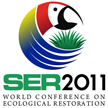Call for Abstracts
Submission Deadline:
January 21,
2011
Join us at NCER '11 for five days of
presentations in eight program tracks, workshops, poster sessions, field
trips and coffee-house discussions dedicated to current topics in
ecosystem restoration. We�ll explore the roles of policy, planning,
science and management in establishing goals and performance
expectations for achieving successful and sustainable ecosystem
restoration.
All individuals working in ecosystem restoration are invited to submit
abstracts describing their efforts, science, projects and results. Oral
and poster presentations will be selected from abstract submissions, and
abstracts from all presentations will be published online in the
conference book of abstracts. Poster presentations will be divided into
two sessions and formal poster sessions will be held for each grouping
to allow maximum time for discussion with individual authors.
Below is a detailed list of topics. You will be asked to identify which
topic is most applicable to your work outlined in your abstract
submission when filling out the online form, so please take a moment to
review this list in advance and select a topic.
PROGRAM TOPICS
-
Adaptive Management toward
Restoration Objectives
-
Chesapeake Bay
-
Climate Change and
Restoration Goals
-
Coastal Habitat
Restoration
-
Comparison and Contrast of
Restoration Programs
-
Design for Climate Change: Terrestrial, Riverine, and
Coastal Ecosystems
-
Ecosystem Goods and
Services
-
Ecosystem Restoration on
Private Lands
-
Ecosystem Restoration
Program Management and Large-Scale Project
Implementation
-
Ecosystems of National
Signficiance
-
Environmental Benefits
-
Estuarine Ecosystem
Restoration
-
Federal Principles and
Guidelines and Ecosystem Restoration
-
Governance and Management
Decision Making
-
Implementation and
Political Challenges to Ecosystem Restoration Programs
-
Instream and Freshwater
Inflow Development
-
Invasive Species
-
Integration of Science and
Engineering in Ecosystem Restoration Programs
-
International Ecosystem
Restoration
-
Legal Issues in Ecosystem
Restoration
-
Louisiana Coastal
Restoration
-
Mapping/Remote Sensing
-
New Planning Approaches
Cumulative Response and Socioeconomic Considerations
-
Riverine Recovery
-
Role of Fire in Ecosystem
Restoration
-
Stakeholder Engagement and
Perspectives
-
Upland Habitat Restoration
-
Urban Ecosystem
Restoration
-
USDA NRCS Mississippi
River Basin Initiative
-
Water Quality Nutrients
Contaminants and Sustainable Sediment Management
SUBMISSION DEADLINE: If you wish to make an oral or poster presentation, please submit an abstract no later than
January 21, 2011. Abstracts MUST be submitted ONLINE via this web site.
Abstract Preparation and Formatting Instructions:
CLICK links below to view a perfectly
formatted abstract:
Word
Document | PDF
-
IMPORTANT NOTE: Use of MS Office 2007 is not standard with many federal agencies. Therefore, we have been asked to only accept MS Office 2003 files to facilitate access of abstract files during the review process.
-
Abstracts
should be no longer than ONE page in length. No graphs or figures should be included.
-
Set margins at 1", top, bottom and sides and use Times Roman font at a size of 12 points.
-
Type abstract title flush left on a line.
-
Type abstract title in upper and lower case, standard title format.
- EXAMPLE: Effects of Temperature Gradations on Pinion Pine Viability
-
Use the following formatting within titles:
italics (for scientific names),
subscript (for scientific formulas and superscript mathematic equations), etc.
-
List the senior author first and
Bold the presenting author
-
Identify author affiliations using superscript numeral references
(See sample below)
-
Do not include professional titles of the authors. Include ONLY the affiliation name, city, state and country in abstract listing. (Please do not include full mailing address at the top of the abstract.)
-
Type the body of the abstract single spaced without indents or tabs.
DOUBLE SPACE BETWEEN PARAGRAPHS.
-
Apply bolding, italics, underlining, superscripts and subscripts in your main text as you want it to appear in your final abstract.
-
Include full contact information for the presenting author at the very end of the abstract as follows:
Contact Information: J. Mark Genesis, Department of Ecology, University of California, Berkeley, CA 94720 USA, Phone: 510-555-5555, Fax: 510-555-5000, Email: jgf@mynet.net
Sample Abstract:
Effects of Temperature Gradations
on Pinion Pine Viability
Terry R. Brown1,
J. Mark Genesis1, and S. Busch2
1Department of Ecology,
University of California, Berkeley, CA, USA
2Department of Soil
Science, The University of Reading, Whiteknights, Reading,
England
This is the abstract main text. Do
not tab or indent. Double space between paragraphs. Apply
bold, italics,
underlines, superscripts and subscripts
as appropriate. Use Times Roman font (or other serif,
proportional font) at a size of 12 points.
List senior author first.
Bold presenter. Group authors by affiliation. Do not
include professional titles. Type affiliation below author
lines. Include only the affiliation name, city, state and
country in abstract listing.
Contact Information: J. Mark
Genesis, Department of Ecology, University of California,
Berkeley, CA 94720 USA, Phone: 510-555-5555, Fax: 510-555-5000,
Email: jgf@mynet.net |
CLICK links below to view
a perfectly formatted abstract:
Word Document |
PDF
The Abstract Submission Process Consists of Completing FOUR Consecutive Steps:
Step 1. Review and Follow Abstract Preparation and Submission Instructions
Step 2. Submit Presenter Profile Information (no typos please)
Step 3. Upload Abstract File (Only MSOffice 2003 Word Versions accepted)
Step 4. Print Abstract Submittal Confirmation Form
After you have successfully completed the first three steps, a confirmation form will be instantly generated on your screen confirming receipt of your abstract. Please keep a copy of this form on file for your records. You will also receive an email confirmation, which we suggest you keep a copy on file in your NCER FOLDER so you have immediate access to your submission information.
If you do not receive a confirmation form, the submission did not go through.
It is your responsibility to follow-up and contact the organizers if you
do not receive an email confirming your submission. For questions or to verify the status of your abstract contact: Beth Miller-Tipton, Tel: 352-392-5930; Email: bmt@ufl.edu
Online Abstract
Submission
Has CLOSED |
|

